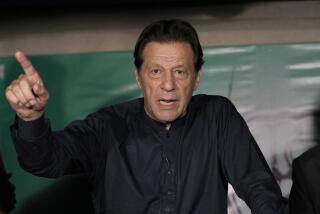Musharraf foe wins right to return
- Share via
ISLAMABAD, PAKISTAN — Pakistan’s Supreme Court ruled Thursday that former Prime Minister Nawaz Sharif, a bitter foe of the country’s president, can return from exile to lead his opposition party in parliamentary elections.
The ruling was the latest in a series of political blows to President Pervez Musharraf, an army general who has ruled unchallenged for most of the last eight years but for whom very little has gone right in recent months.
Pakistan’s political turmoil is being closely watched in Washington. Musharraf, 64, is considered a crucial ally in the United States’ war against the Taliban and Al Qaeda, but the depth of his commitment to quelling Islamic radicals has been questioned by some Bush administration officials and outside observers.
Sharif, whom Musharraf ousted in a military coup in 1999 and banished the following year, has emerged as the politician perhaps best positioned to pose a strong challenge to the president, whose popularity is at an all-time low.
Musharraf has previously considered imposing emergency rule, a step that would stifle dissent and probably delay the election scheduled to be held by early 2008. His aides have said the option of emergency rule remains open.
Thursday’s ruling does not prevent the government from taking legal action against Sharif if he returns.
Prosecutors have suggested they might try to reinstate the life sentence Sharif had received for corruption and other charges before he agreed to leave the country.
Sharif’s supporters rejoiced in front of the high court complex here in the capital when the ruling was announced.
One supporter slaughtered several bleating goats in a celebratory display, leaving rivulets of blood congealing on the pavement in the hot sun.
The ruling was read out by Chief Justice Iftikhar Mohammed Chaudhry, who, since his reinstatement July 20 after an attempt by Musharraf to oust him, has rapidly established himself as the general’s legal nemesis.
Musharraf had suspended Chaudhry in March, accusing him of misconduct. The move provoked an unexpectedly powerful grass-roots opposition in support of the jurist that speedily transformed into a larger movement demanding a return to civilian rule.
The high court threw out the charges against Chaudhry last month, and the court is now poised to rule on a number of cases that bear directly on Musharraf’s ability to continue as both president and army chief.
Chaudhry declared that Sharif and his family, including his brother Shahbaz, also a politician, have “an inalienable right to enter and remain in the country as citizens of Pakistan.”
The court also issued a veiled but unmistakable warning to the government against trying to prevent Sharif’s return, saying his homecoming should not be “hampered or obstructed” by the authorities.
Private Pakistani television channels, which have been emboldened by Musharraf’s troubles, repeatedly broadcast coverage of a triumphal news conference by Sharif in London. The former prime minister called the ruling “a victory for democracy and a defeat for dictatorship.”
Sharif did not set a date for his return but said it would be soon.
The ruling complicates matters not only for Musharraf but also for Benazir Bhutto, another exiled former prime minister who hopes to return to Pakistan before the parliamentary elections.
Bhutto has been in talks for more than a year to work out a power-sharing arrangement with Musharraf that would allow her to return to the country without facing the corruption charges that forced her into exile eight years ago. But the Pakistani president is now so unpopular that Bhutto may find it impossible to ally herself with him.
Sharif wasted no time in taking a shot at Bhutto, saying that at this point any accord with Musharraf would be wrong.
“I don’t believe in any power-sharing with Musharraf,” Sharif said. “He is a dictator; we are democrats.”
The Pakistani government made no immediate formal response to the court’s ruling. A senior Cabinet minister, Sheik Rashid Ahmed, told the Associated Press that the ruling had been expected, and “I think we have to accept the court verdict.”
Sharif, who had tried to fire army chief Musharraf shortly before the coup, was charged not only with corruption but also with hijacking for forbidding the general’s plane to land in Pakistani territory in a bid to stave off the coup.
During proceedings leading up to Thursday’s ruling, government lawyers insisted that Sharif had agreed at the time of his banishment to spend 10 years in exile in Saudi Arabia in lieu of his life sentence. Sharif’s lawyers said the pledge had been made under duress.
Sharif, whose government was viewed as incompetent and corrupt, was a deeply unpopular prime minister at the time he was ousted by Musharraf. Now, however, polls indicate his Pakistan Muslim League faction is about as popular as Bhutto’s and much more so than Musharraf.
Sharif’s party said he hoped to return in time not only to run in the parliamentary elections, but also to block a move by Musharraf to have himself approved for another five-year presidential term by the outgoing national and provincial assemblies, which he controls. They are scheduled to be dissolved Nov. 15, and fresh elections are to be held within 90 days.
“We hope he will be back in time to act against this undemocratic move,” said party spokesman Ahsan Iqbal.
Musharraf’s aides have said he intends to hold the vote to extend his rule between Sept. 15 and Oct. 15. Court challenges to that plan are pending.
Human rights groups welcomed Thursday’s ruling.
New York-based Human Rights Watch issued a statement urging the government to “respect this verdict and allow [Sharif] to return to Pakistan without fear of harassment and threats.”
--
Special correspondent Zaidi reported from Islamabad and Times staff writer King from Istanbul, Turkey.
More to Read
Sign up for Essential California
The most important California stories and recommendations in your inbox every morning.
You may occasionally receive promotional content from the Los Angeles Times.













